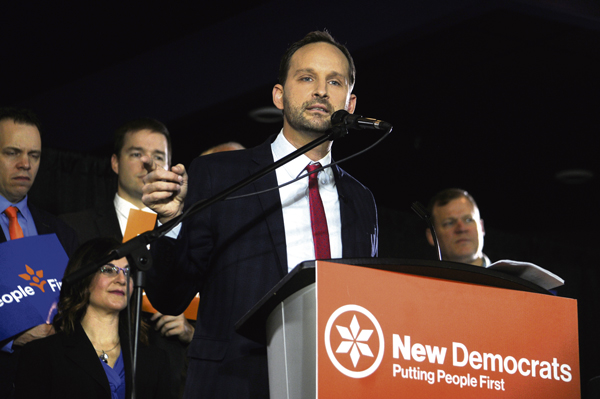The Saskatchewan NDP released its economic recovery plan for post-COVID-19 on Thursday.
Most of the points in the plan relate to issues the the party has previously voiced.
NDP leader Ryan Meili said that’s because the province “was already stretched too thin” before the pandemic with overcrowded classrooms, lack of staff in emergency rooms and too many families living paycheque to paycheque.
“This crisis has exposed and deepened those struggles and made action more urgent,” Meili told reporters at the Saskatchewan Legislature.
He argued that the Saskatchewan Party is acting like things will eventually go back to normal. In reality, said Meili, “business as usual had people hurting.”
The economic recovery plan doesn’t come with projected costs, however. Instead, it lists a number of ways the NDP plans to strengthen the economy in three parts: People First, Grow Local and Future Focus.
“It’s time to rebuild and renew—to make the lives of Saskatchewan people a little easier and a lot better,” said Meili.
“For a brighter future in Saskatchewan, we need to invest in people.”
NDP Finance Critic Trent Wotherspoon said the plan looks to “fire up the economy” through investments in key areas like education.
Meili said Saskatchewan has one of the slowest rates of job regrowth and that one in four children in the province are living in poverty.
He argued that Saskatchewan has the worst record in Canada for accessible and affordable childcare, showing the need for more investments in the province’s kids.
“We know they (the Saskatchewan Party) have no plan, just the same old playbook we saw in 2017. When they got into difficult times, their first reflex was to cut health care, cut education, cut libraries, cut funerals for the most vulnerable, eliminate STC,” he said.
“Cuts to health care and education—to the services we all count on—will only make things worse and make our recovery from COVID-19 longer and harder.”
A report from the Regina Leader-Post indicated the province’s economy was already shrinking, even before COVID-19. A Financial Post story published Thursday cited an RBC report indicating lagging resource prices would make it more difficult for provinces such as Saskatchewan and Alberta to recover, while other jurisdictions, such as Manitoba, BC and New Brunswick, would be leaders in Canada’s economic recovery.
A recent report from the CFIB, though, indicated that small businesses in Saskatchewan are faring amongst the best across the country. While only 25 per cent have recovered to pre-pandemic sales, that number is higher than most other jurisdictions. More Saskatchewan businesses have also reopened than the national average.
A pared-down version of the provincial budget released in March estimated increases for health and education. However, Finance Minister Donna Harpauer warned of a deficit because of COVID-19.
The deficit would be a pandemic one caused by increased spending and a loss in revenue, and not a structural one, which would be indicative of a longer-term issue with the provincial economy, Harpauer said.
The provincial government has since announced funding for infrastructure projects over the next two years as part of what it calls stimulus spending. Those projects have been announced over the past several weeks. Some of that funding was previously announced in March as part of the budget estimates, though more projects have since been added to the provincial list.
The province has said its full budget, due on June 15, will mostly follow along the spending estimates released in March, but will also include an updated revenue projection.
The NDP plan, called A People-First Recovery, also voices the need for high-speed internet, home care, investing in mental health treatment and raising the minimum wage to $15 an hour. Those same promises have been previously unveiled as part of the party’s pre-election platform, and were discussed at the party’s convention held in Prince Albert last November.
Last week, the province announced a $0.13 increase to the minimum wage from $11.32 an hour to $11.45 an hour.
— with files from Peter Lozinski


